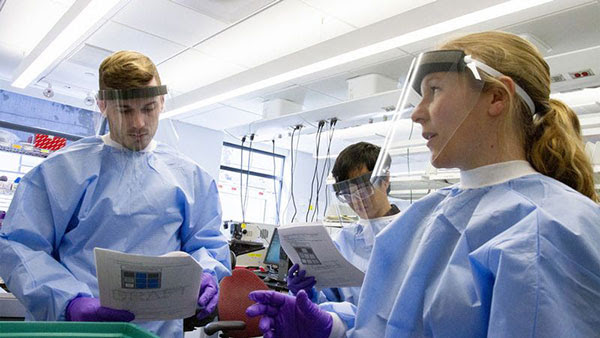
Michelle Cipicchio (right) trains two lab technicians at the Broad Institute to extract viral RNA from patient samples. (Scott Sassone/Broad Institute)
40 million dead if we had done nothing
- The COVID-19 pandemic could have infected 90% of the world’s population and killed 40.6 million people if no mitigation measures were put in place to combat it. Estimates from an influential modelling group at Imperial College London highlight the importance that acting early had on suppressing the outbreak. (Nature | Continuously updated)
- As labs shut down around the world, researchers are finding creative ways to donate their time, supplies and expertise. Meet a few of the tens of thousands of scientists who are redeploying to fight coronavirus. (Nature | 4 min read)
- Why do some people infected with the SARS-COV-2 virus feel OK, while others — even those who are healthy and relatively young — get very ill? Some researchers are gearing up to search huge national genetic databases, such as the UK Biobank for the DNA variations that might give the answers. Others are recruiting patients with COVID-19 directly within hospitals, who are willing to share their genetic and health data. (Science | 6 min read)
- There is a clear divide among nations when it comes to the public use of face masks — from commonplace in much of Asia, to strongly dissuaded in the United States, to obligatory in the Czech Republic. There is only meagre evidence that mass mask-wearing will help to slow the spread of COVID-19, and there are downsides — whether from a false sense of security or a shortage of masks for health workers who sorely need them. Science outlines the arguments on both sides. (Science | 6 min read)





















.png)












No hay comentarios:
Publicar un comentario